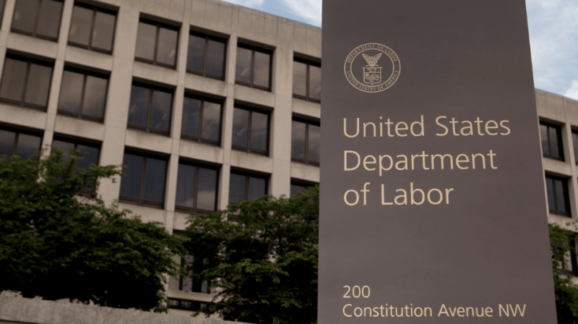Chavez-DeRemer exemplifies Trump’s complicated relationship with unions

Photo Credit: Getty
The Senate confirmed former Oregon Congresswoman Lori Chavez-DeRemer in a 67-32 vote Monday as President Trump’s new labor secretary. CEI and others in the free-market movement have opposed her nomination but the Trump administration stuck by its pick and pressured Senate Republicans to back her. Only three Republicans voted no.
Chavez-DeRemer’s confirmation is a microcosm of Trump’s own complicated relationship unions and labor policy in general. She was opposed because of her co-sponsoring the ill-named Protecting the Right to Organize Act (PRO Act) as well as the Public Service Freedom to Negotiate Act. Both bills would give union leaders more power to force workers to fall in line and support unions. Chavez-DeRemer was among the very few Republicans to back both bills, putting her on the short list of nominees acceptable to labor leaders like International Brotherhood of Teamsters President Sean O’Brien and American Federation of Teachers President Randi Weingarten. The Trump administration never wavered in its support for her and with the administration’s first few weeks being so tumultuous, conservative opposition never gained traction.
However, during a Senate Health, Education Labor and Pensions Committee hearing, Chavez-DeRemer largely disavowed her support of the PRO Act, saying she disagreed with its key provisions. She claimed instead to have co-sponsored the legislation solely to have “a seat at the table” on labor policy reform.
In addition, the White House has nominated Keith Sonderling to be assistant secretary, the department’s number two position. Sonderling was the author of some of the first Trump administration’s most notable free market polices.
On the whole, Trump has supported a free market approach towards labor issues. In his first term, he nominated conservatives like Alexander Acosta, Andy Puzder, and Eugene Scalia to run the Labor Department and backed free-market rulemakings on issues such as joint employer, overtime and independent contracting. Business groups praised the actions while unions leaders scorned them. Generally, Trump was not focused on labor policy during his first administration. He hired some smart people and let them take care of it while he focused on issues like trade.
During the first Trump administration, most union leaders fell in line with their liberal allies calling his presidency a disaster. The late AFL-CIO President Richard Trumka said, “Instead of rebuilding America, he’s torn it apart.”
The rank and file in the labor movement have viewed Trump more positively however and his support within the Teamsters was so strong that the union refused to make any endorsement in the last election. This time around the unions are trying a friendlier approach, exemplified by O’Brien’s speaking slot at the last GOP convention.
Trump himself has never been a knee-jerk anti-union guy. As a real estate developer in the 1980s, he frequently dealt with building trade unions. He has a nostalgic fondness for those blue-collar unions, seeing them as a part of the middle-class American culture exemplified by TV’s Archie Bunker.
In his 2000 book The America We Deserve, he said, “Is Trump a union man? Let me tell you this: Unions still have a place in American society. In fact, with the globalization craze in full heat, unions are about the only force reminding us to remember the American family.” Trump’s tariff-heavy trade policy is driven in part by the belief that he is protecting domestic workers by shielding them from foreign competition.
Trump is also a former card-carrying union man himself, having previously been a member of the Screen Actors Guild-American Federation of Radio and TV Artists (SAG-AFTRA) through his appearances in films and reality TV shows. Note that he is a former SAG-AFTRA member. The union revoked his membership following the Jan. 6, 2021 riots on Capitol Hill. Still, Trump is only the second US president to have belonged to a union. The other was Ronald Reagan, former president of the Screen Actors Guild.
This affinity for unions has not resulted in Trump adopting the union leaders’ policies. Not yet anyway. And recent moves by the administration have outraged unions, such as revoking collective bargaining for Transportation Security Administration (TSA) workers.
The charitable read of Chavez-DeRemer’s appointment therefore was that Trump was throwing a bone to union leaders like O’Brien, without committing his administration to letting them set the agenda. It is worth pointing out that Chavez-DeRemer was not an original co-sponsor of the PRO Act, only signing on to it a few months before she headed into a tough re-election bid that she ultimately lost.
The less charitable read of Chavez-DeRemer’s nomination is that labor leaders are looking for cracks in the Trump administration and seizing on them when they can in the hopes of gaining a foothold. Time will tell which read is more accurate.